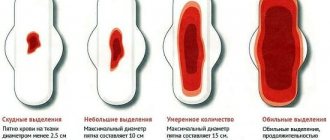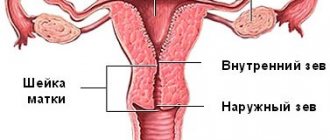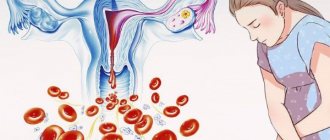The resource of the female reproductive system is sooner or later exhausted and menopause occurs. This phenomenon is inevitable, and for each woman the time of its onset is absolutely individual, and the symptoms and manifestations of this period also differ. Common symptoms are changes in the menstrual cycle, and less and less frequent periods, which over time stop altogether.
A woman should know how menstruation can occur during menopause, with what frequency and intensity, in order to be able to distinguish the onset of natural hormonal changes from signs of dangerous gynecological pathologies.
Menstruation at different stages of menopause
Menopause is divided into three stages:
- initial – premenopause;
- medium – menopause;
- late – postmenopause.
Premenopause is the period of time from the first menopausal symptoms to the end of menstruation. For different women, this period lasts from 2 to 10 years. The decline of reproductive capacity can be rapid and intense, and sometimes completely imperceptible. At the first stage of menopause, a woman notices pronounced or unexpressed disruptions in the cyclicity of menstruation. Menstrual flow varies from month to month in duration and abundance. But short and light discharge is considered normal during premenopause. Prolonged and heavy menstrual bleeding usually indicates pathological conditions that require medical attention. Common symptoms of premenopause are weakness, chronic fatigue, memory problems, deterioration in appearance, and discomfort during sexual intercourse.
Menopause is the period of time that is one year after the last menstruation in life. The work of the ovaries completely stops, and the body experiences an estrogen deficiency, since only estrogens produced in adipose tissue remain. There is no more ovulation, therefore the woman cannot become pregnant.
Postmenopause is the final stage of menopause. Any vaginal bleeding during this period should be regarded as a pathology.
Uterine bleeding during menopause
Failure of the menstrual cycle during menopause is a physiologically based phenomenon. However, not all changes are normal. Sometimes, under the mask of menstruation, uterine bleeding is hidden, which is life-threatening and requires immediate medical attention.
It is difficult to determine on your own which discharges during menopause are pathological. You should be wary of the following accompanying menstrual symptoms:
- pain in the abdomen and lower back;
- the presence of clots in the secretions;
- temperature increase;
- painful urination;
- nausea, vomiting;
- change in blood pressure.
Menopause is a rather dangerous period for the occurrence of pathologies, among which benign (fibroids, polyps, cysts) and malignant neoplasms are not the least important. It is they and a disease such as endometrial hyperplasia that can cause bleeding similar to menstruation.
Women approaching menopause should visit a doctor at the slightest disruption of the menstrual cycle. A visual examination by a gynecologist, ultrasound and laboratory blood tests will help determine the true nature of the changes and, if necessary, begin treatment in a timely manner.
It is important to remember that menstruation during menopause will sooner or later stop completely. If menstruation is absent for a year, menopause is diagnosed. The next stage is called postmenopause, during which ovarian function completely fades and menstruation becomes a physiologically impossible phenomenon.
Any discharge of blood from the vagina during this period is pathological and requires immediate medical attention.
Reasons for early cessation of menstruation
Premature decline of reproductive function can be a consequence of various factors.
- Genetic abnormalities. Early entry into menopause has been genetically fixed in the body since the girl’s prenatal development.
- Mental disorders. Today, women constantly face stress, are nervous , cannot keep up with the accelerating pace of life, and as a result suffer from depression, mental and nervous system disorders. And this condition inevitably leads to accelerated aging.
- Chronic diseases. Diabetes, heart and vascular pathologies, liver dysfunction, and cancer deplete the body and provoke premature aging of the reproductive system.
- Living conditions. Women who live and work in favorable moral and economic conditions, having everything they need for comfort, later face a decline in reproductive ability and maintain an active lifestyle in their older years.
- Climatic conditions. In hot countries, girls enter puberty earlier. Consequently, if menstruation comes early, then it ends earlier.
- Features of sexual life. In women who regularly and enjoy sex, menopausal symptoms appear later than in women of the same age who have problems with intimate relationships.
Why do menstruation occur after menopause?
According to medical statistics, most often women suffer from spotting six months after their long absence. A variety of factors can provoke these symptoms, but only a gynecologist can accurately determine the etiology.
So, the onset of menstruation after menopause can be triggered by:
- diseases affecting the reproductive system. Quite often, menstruation after a year of menopause is a sign of inflammatory processes developing in the endometrium. During diagnostics, a specialist must evaluate the condition of the reproductive organs, in which pathological processes can also be observed.
- Hormonal imbalances. It is no secret that against the backdrop of menopause, the processes of producing the necessary hormones of the female body are faced with large-scale changes. As a rule, it is precisely in conditions of a lack of progesterone, necessary to maintain the endometrium in a normal state, that the development of atrophic processes is observed.
- Undergoing specific treatment using certain medications.
- Cyclic therapy, which results in increased production of progesterone.
- Diseases and dysfunction of internal organs, which can also provoke menstruation a year after menopause. Often, such unexpected symptoms are observed against the background of liver cirrhosis, thyroid dysfunction, hypothyroidism and hyperthyroidism.
Changes in menstruation during premenopause
Menstruation during premenopause undergoes a number of significant changes.
- The interval between days of menstrual flow may increase or decrease. A woman cannot determine when her next period will begin.
- The duration of menstrual flow increases and decreases from month to month.
- The volume of blood released may be scanty, leaving minor smear marks on the underwear. But sometimes the amount of bleeding increases, usually after a long delay. In this case, you should be wary, since an increase in blood volume may signal an ectopic pregnancy and other serious pathologies.
- Bleeding may be accompanied by blood clots or foul-smelling brown discharge from the vagina.
- There is an exacerbation of PMS, pain in the lower abdomen becomes more intense.
- During menopause, the functioning of the thyroid gland may be disrupted, and because of this, vaginal bleeding may occur.
It's normal for your periods to change during premenopause. But if a woman experiences suspicious symptoms, she should immediately consult a medical specialist.
My period returned - why?
Menstruation may return after menopause for several reasons:
- sudden hormonal release;
- taking various hormonal medications to treat age-related diseases;
- taking herbal preparations containing phytohormones.
There are cases when menstruation recovers spontaneously and follows the same pattern after a long period of rest. Such jumps can be caused by stress, sudden weight loss, strict diet, vitamin deficiency and physical overexertion. Whatever the reason for the resumption of menstruation during menopause, this process requires mandatory monitoring by a specialist, since spotting at this time may indicate the presence of serious diseases in the female body.
Determination of diseases by menstruation
Many women, when premenopause begins and their periods lose their cyclicity, experience uterine bleeding associated with dysfunction of the reproductive system. This condition is characterized by heavy bleeding from the vagina, accompanied by nervous and endocrine disorders.
It is enough to experience a large loss of blood a couple of times for anemia to develop. With uterine bleeding, a woman feels weak and dizzy when her body is in an upright position.
Excessive bleeding may be a sign of:
- estrogen and progesterone deficiency;
- polyposis;
- fibroids.
Prolonged bleeding is not something to joke about. You definitely need to go to the doctor. Typically, patients are immediately prescribed a blood test for iron levels. The mineral stimulates the formation of red blood cells, due to which anemia is quickly eliminated. To normalize your well-being and reduce blood loss, you should take Ibuprofen every 5 to 6 hours.
Bleeding caused by hormonal imbalance can be eliminated using comprehensive measures. A woman should be examined not only by a gynecologist, but also by an endocrinologist and a neurologist. The main methods of treating uterine bleeding are curettage and normalization of the nervous system. In addition to iron supplements, hormonal medications and vitamin complexes are prescribed.
If, despite treatment, bleeding does not go away, then the woman is sent for a full medical examination. Perhaps the cause of the pathological condition is hidden diseases of the internal organs.
When can bleeding be considered dangerous?
There is nothing abnormal about the fact that during menopause there are no periods for several months, and then they begin to come very profusely. But if this worries you, then you should pay attention to the nature of the discharge. In the following cases you need to be wary:
- The bleeding is too profuse (this has never happened before), the pad gets completely dirty in less than an hour.
- Heavy periods with clots have been going on for more than a week, and there are no signs that they will end soon.
- There are many foreign impurities in the blood such as blood clots, mucus and other things.
- Blood comes from the vagina either during sexual intercourse or immediately after it.
- Menstruation occurs much more often than expected (once a month).
- Quite noticeable pain in the lower abdomen, which lasts for much more than a week (normally - the first two days after the start of discharge).
All these factors may indicate the presence of uterine bleeding, so you should immediately consult a doctor, since only he will be able to determine whether this is normal, or whether such bleeding needs to be treated immediately. In any case, delays in this situation can cost you your health and even your life.
Reasons for missed periods
Delayed menstruation during premenopause is normal. This means that the body is preparing to enter the menopause stage without failure. Changes in the menstrual cycle and other features of the premenopausal period are individual for each woman. But perimenopause should always end in the same way - the complete cessation of menstruation.
Scanty, spot-like periods during perimenopause are normal and should not be a cause for concern. But you need to go to the doctor when bleeding either becomes abundant and prolonged, or is completely absent at the initial stage of menopause.
Menopause and menstruation: termination in 4 ways
Menopause is a certain time in the life of every woman when sexual function declines.
Menopause and menstruation are connected, during menopause there is a gradual cessation of menstruation. After menopause ends, a woman is unable to get pregnant and carry a child. The age a woman reaches menopause varies greatly. Menopause can begin either at 40 or 55, but on average it begins at 48-53 years.
The decline of sexual function occurs slowly and gradually, even after menstruation has completely stopped, a certain amount of the hormone estrogen remains in the body and the woman still enjoys sex and life in general.
It cannot be said that the end of menstruation is the main indicator of the end of menopause. Many women who are still menstruating feel unwell, with weakness, headaches and sweating. And there are women whose periods have stopped for 2-3 years and they feel fine.
Menopause and menstruation are closely related to each other and the cessation of menstruation can occur in 4 different ways:
- My periods stop gradually, my periods come less and less often, the intervals between periods become longer, and the discharge itself becomes scanty. This loss of menstruation can last 3 years, or it can happen in just a year.
- For some women, it is common for menstruation to stop very abruptly. Up to a certain age, a woman can have a regular menstrual cycle and at one point her period simply won’t come.
- In some cases, menstruation may stop abruptly, and then resume again after a few months. Gradually, menstruation appears less and less often, with long intervals of 4-5 months.
- Erratic cessation of menstruation, they may stop and then resume again after a few months. Bleeding may be profuse and frequent, several times a month. This ending of menstruation should alert you, as it may be a signal that not everything is in order in the body. Such bleeding is typical if there is a tumor of the uterus or ovaries in the genitals.
The decline of menstruation can occur over many years, the year in which the last menstruation occurred is called menopause, and all subsequent years are called postmenopause. Postmenopause can last from a year to ten years, in each individual case it is individual.
Causes of long periods in premenopause
Long periods in premenopause clearly signal the development of a disease of the reproductive system. A woman should be wary if she has prolonged menstrual flow that lasts longer than a week, clots are noticeable in the released blood, long monthly cycles take more than 20 days, and blood appears during sexual intercourse. The following pathologies are the causes of long periods:
- Myoma is a benign uterine tumor. The tumor grows slowly, so it does not appear for a long time. In postmenopause, due to the lack of menstruation, fibroids usually dry out.
- Polyposis is a harmless uterine growth. The only possible manifestation of polyps is prolongation of menstruation.
- Polycystic disease is the formation of multiple cysts in the ovaries, associated with disruption of the endocrine glands during menopause. The disease is accompanied by intense bleeding from the vagina.
- Endometriosis is a pathological growth of the uterine endometrium.
- Adenomyosis is the ingrowth of the endometrium into the muscular uterine wall.
- Blood clotting disorder.
- The use of hormonal contraceptives, due to which hormonal levels fluctuate, vaginal bleeding occurs.
- Installation of an intrauterine device.
A woman who has had her period for too long since the onset of menopause should undergo a full medical examination to determine the factor that caused the pathological phenomenon.
Why do heavy periods appear during menopause?
The main reasons that provoke the appearance of heavy bleeding during menopause include:
- the appearance of polyps;
- endometriosis;
- polycystic disease;
- hormonal disbalance;
- manifestation of uterine fibroids;
- the presence of benign formations;
- vaginitis;
- imbalance in the functioning of the endocrine system;
- ovarian tumors;
- hyperplasia.
Diagnostics
Based on the collected medical history, doctors can easily determine the symptoms of premenopause in patients. A blood test is required for progesterone, estrogens, FSH and LH, and a number of diagnostic measures are prescribed to determine possible pathologies and complications of menopause.
- Clinical blood test. Necessary for determining inflammation in the reproductive organs.
- Ultrasound of the pelvic area to identify organic disorders.
- Biochemistry of blood.
- Diagnostic curettage, which allows you to find out about diseases of the uterus.
- Cytological smear of the cervix. Helps detect the presence of malignant cells.
- Coagulogram. Determination of blood coagulation level.
Pathologies and complications during premenopause
Typically, the period of onset and development of premenopause occurs without negative phenomena, but the danger of early menopause lies in the possible occurrence of the following pathologies:
- prolonged menstrual flow;
- heavy periods, during which the pad is changed every 2 hours;
- bleeding in the middle of the cycle.
If the above pathological phenomena occur, a woman should immediately consult a gynecologist.
Menstruation after a year of menopause. What to do?
All women fearfully await the onset of menopause, which marks the end of childbearing age. There is an opinion that the menopause period is so difficult that it is often accompanied by serious nervous breakdowns.
But medical practice is ready to challenge this fact, because in fact, only a small part of women experience obvious changes of a mental and physical nature.
As you know, menopause is accompanied by the cessation of menstruation. If, after a certain time after menopause, your periods begin, you should definitely seek qualified help. Only a doctor can determine the etiology of the manifestation, the degree of danger and methods of elimination.
Treatment of menstrual complications during premenopause
For 10 out of 100 women, the signs of perimenopause are unpleasant and painful. There is no need to endure discomfort; there are many methods to make you feel better. A woman should contact a gynecologist to determine the possible causes of pain and prescribe optimal therapy.
Hormonal drugs
In case of severe onset of menopause, synthetic analogues of female sex hormones are prescribed. These drugs stabilize hormonal levels until the functioning of the reproductive system completely stops. There are different categories of hormonal medications.
- Progestins – Norkolut, Turinal. These medications cause the second phase of the cycle - endometrial detachment. As a result, menstrual flow appears, and menopausal symptoms subside. Treatment lasts from 2 to 3 months.
- Combinations of estrogens and progestins - Janine, Marvelon. These medications both perform a contraceptive function and reduce menopausal symptoms.
- Combined non-contraceptive drugs - Divina, Klimonorm, Klimen. Intended to eliminate severe symptoms of menopause.
- External hormonal agents - Ovestin, Estrocad. Intended to moisturize the mucous membranes of the genital tract and normalize the condition of the genitourinary system. Available in the form of vaginal creams and suppositories.
Herbal preparations
Hormonal medications have a huge list of contraindications. Therefore, for women who are unable to take synthetic hormones, herbal preparations based on phytohormones .
To eliminate hot flashes and other unpleasant manifestations of menopause, the drugs Klimadinon, Klimaktoplan, Remens, Estrovel are prescribed. These medications contain natural hormone-like substances extracted from black cohosh, soybeans, and red clover.
Herbal preparations do not act as quickly and effectively as synthetic hormones, but they are completely harmless to the female body and do not provoke cancer, heart or vascular pathologies.
Vitamin complexes
To make it easier for the body to cope with age-related hormonal changes, it is recommended to supply it with a sufficient amount of vitamins. Thanks to taking vitamin complexes:
- blood circulation in the pelvic area is normalized;
- metabolism improves;
- immunity is strengthened.
Vitamin complexes for women experiencing menopause must contain folic acid (B9), pyridoxine (B6), tocopherol (E), carotene, calcium, magnesium, and iron. These substances in the optimal dose are found in complexes:
- Doppelhertz Menopause;
- Alphabet 50+;
- Menopace.
After vitamin therapy, the appearance improves, the skin structure is restored, and baldness stops.
No matter how premenopause progresses, no matter how intense the symptoms of menopause appear, a woman should take care of her health. During menopause, it is necessary to eat well , lead an active life, and periodically visit a gynecologist for preventive purposes.










